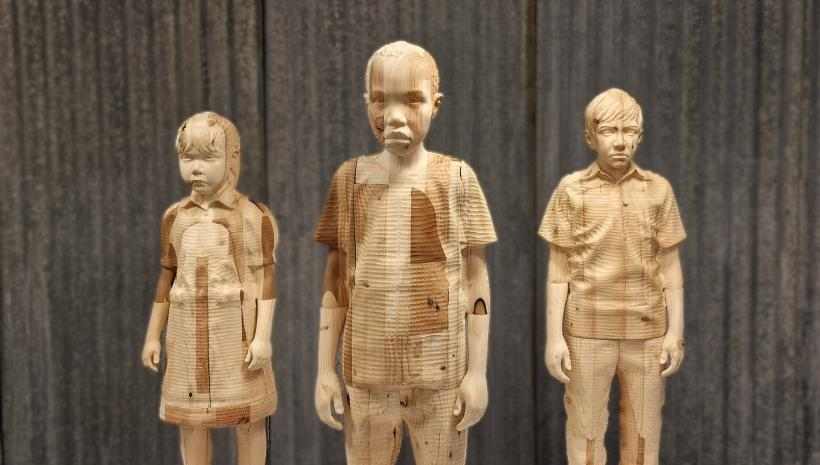Pop-up exhibition of The class of no tomorrow
Children do not start wars, and they cannot end them, but they always pay the highest price.
From widespread killing, maiming, abduction and sexual violence to recruitment into armed forces, and strikes on schools and hospitals– children living in conflict zones around the world continue to come under attack on a shocking scale.
Children are only children after all, and they must be protected.
According to the UN Convention on the Rights of the Child, children have the right to protection in war and from violence. Unfortunately, this is not the case for many children today.
Today, one in four children lives in a country affected by conflict or crisis.
Before, during and after humanitarian emergencies, UNICEF is on the ground, bringing lifesaving help and hope to children and families.
We never give up.
The class of no tomorrow
The figures can't speak, but they tell a tragic story of the reality for the children living in areas affected by war and conflict. They are built with wood from the remains of schools destroyed by armed conflicts, and you can see wounds from bullets and shrapnel in the figures. The wood was sourced from Novotoshkivske School in Ukraine, Ogweni Primary School in South Sudan og Khalid bin Wal id School in Iraq.
They are not modeled after one child in specific, but they represent children from the countries the wood is gathered from. Meet some of the children from these countries:
Iraq

During the war, Abd (12) was hit in his eye by a piece of shrapnel from an airstrike. Now he attends lessons at an informal education center supported by UNICEF, for out-of-school children aged 6-12.
-I have friends and a teacher who teaches me. Attending the center for one year has changed my life. I'm not able to join a normal school. I'm more focused on my education. My life has changed for the better, Abd says.
Decades of conflict and under-investment in Iraq have destroyed what used to be the best education system in the region. Today, there are close to 3.2 million school-age Iraqi children out of school.
UNICEF supports the implementation of an education programme for out of school children and pupils who need extra classes to make up for years they spent out of school. We use e-learning which meets the education needs of Syrian refugee children, in addition to expand access to schools, especially for girls, in areas where there are no schools.
Donate now to help children like Abd.
South Sudan

-The conflict affected us a lot, when people kept fighting, there was a constant pause of our schools and that usually affected our school activities, says Emmanuel (17) from Juba in South Sudan.
-I love music and playing the guitar, but the conflict never enabled a good secure space for me to exercise my passion.
More than 2.8 million children, or over 79 percent, are out of school in South Sudan.
UNICEF is supporting the building of classrooms, the education and training of teachers, the development and printing of textbooks and working with communities to encourage parents and caregivers to send their children to school.
Donate now to help children like Emmanuel.
Ukraine

10-year-old Margaryta sits in a classroom, where UNICEF has delivered new generators for heating. The children are getting used to sheltering in the basement.
-When the air raid siren occurs, there are explosions or planes are flying around, a bomb can be dropped and it can cause damage. That's why we always go to the shelter, says Margaryta.
In Ukraine, 1.2 million children only has access to sporadical education or all education is online. More than 2,000 schools along the frontlines are closed due to safety reasons.
In areas where the security allows, UNICEF works on rehabilitating schools and renovating school basements into air raid shelters. Shelter supplies and winterization support has been provided to 1,000 schools across Ukraine to allow children to study when the air raid sirens occur. In areas where it's not safe to attend school, UNICEF has developed and provided resources for online learning, laptops for teachers, and webinars and online tools for psychosocial support for teachers, children and parents.
